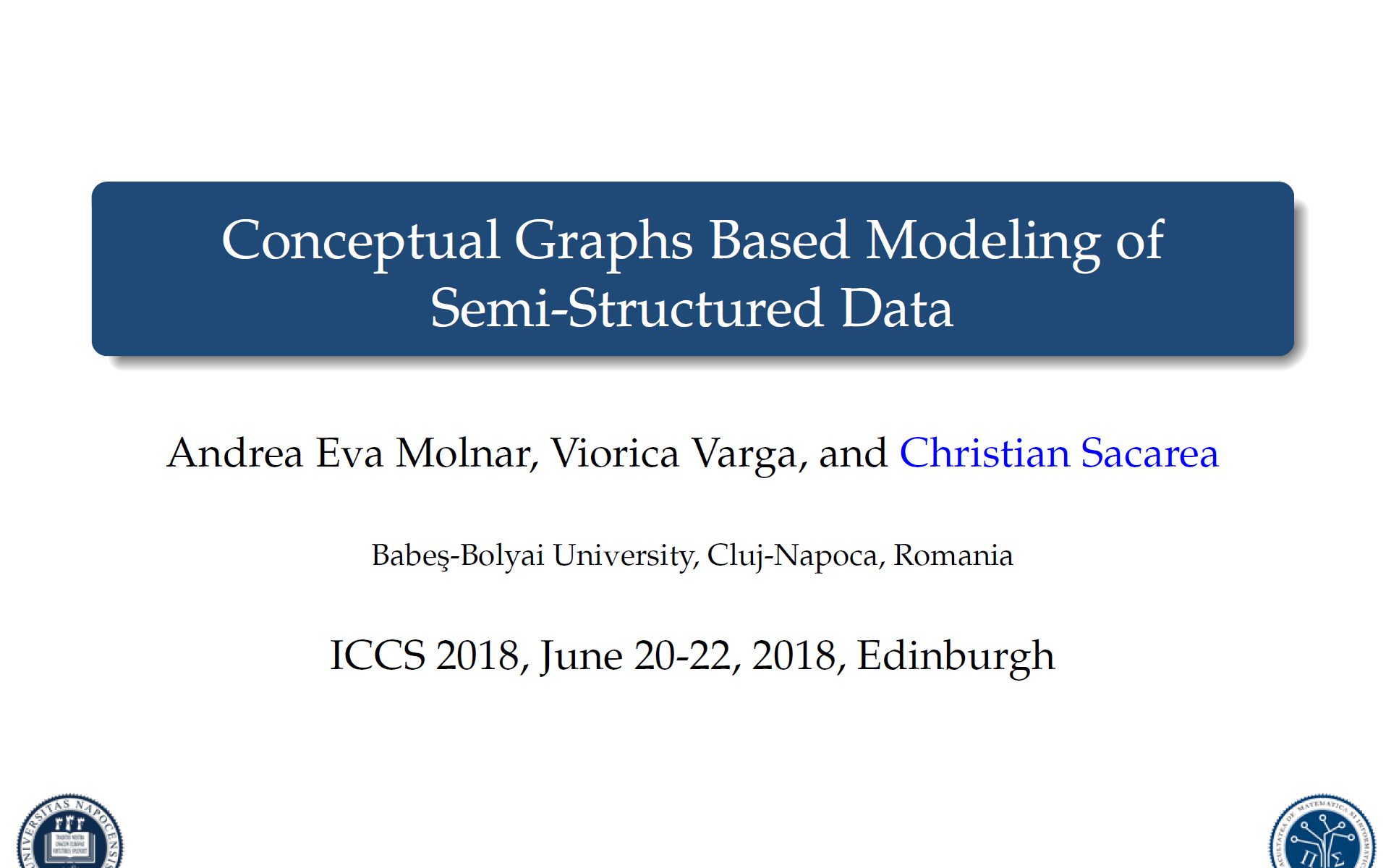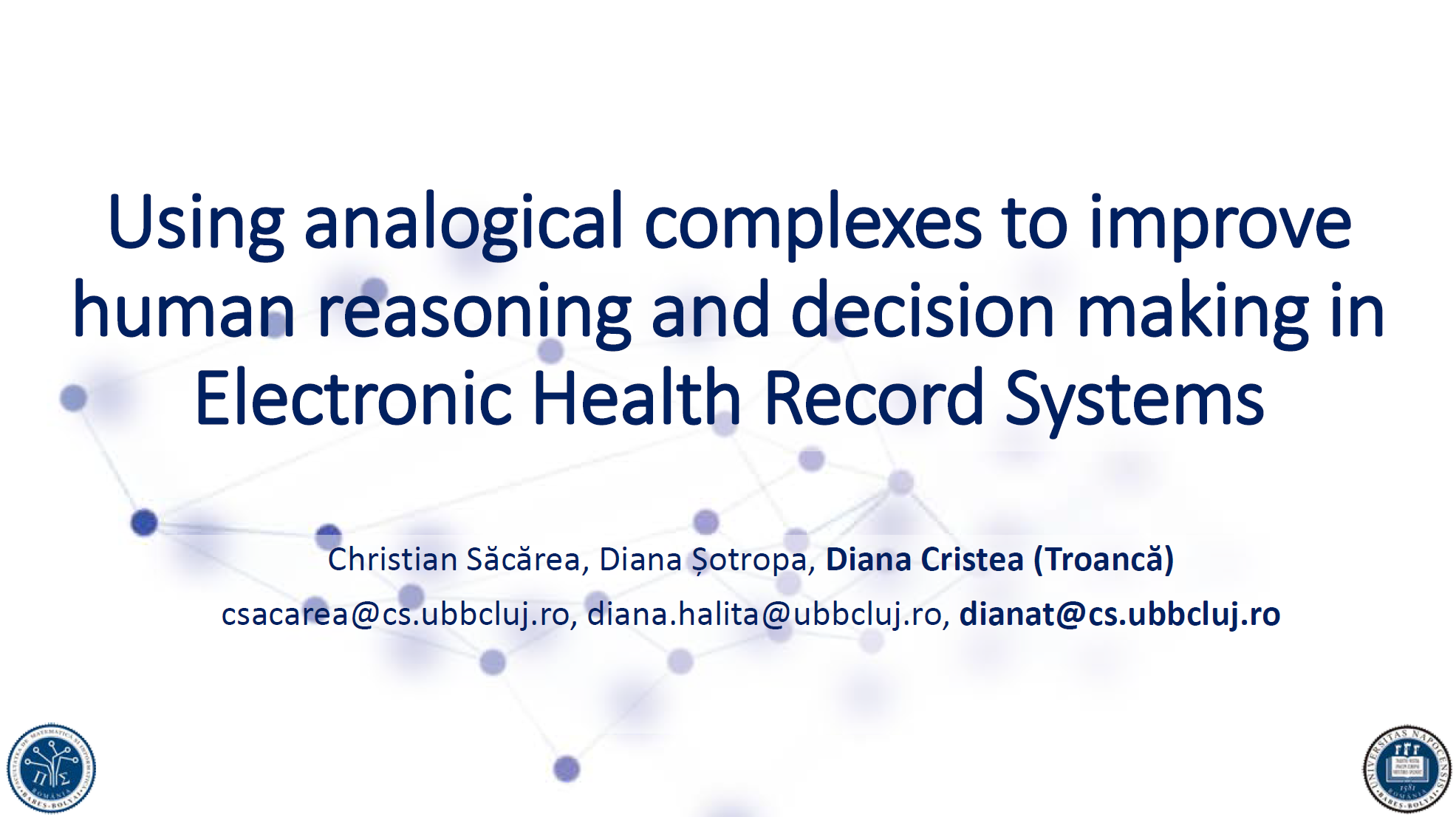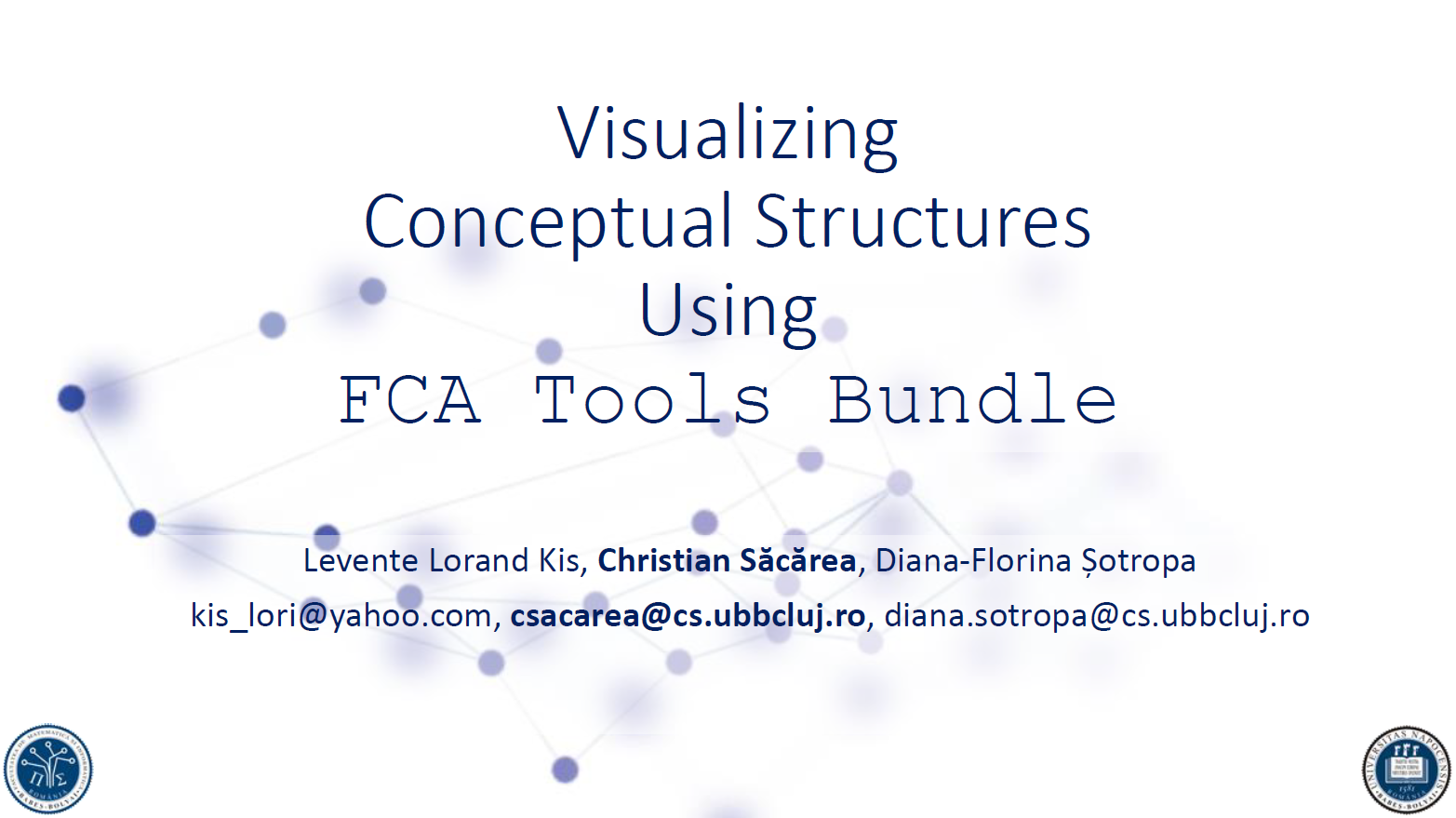Abstract:
Tools that focus on static code analysis for early error detection are of utmost importance in software development, especially since the propagation of errors is strongly related to higher costs in the development
process. Formal Concept Analysis is a prominent field of applied mathematics that uses conceptual landscapes to discover and represent maximal clusters of data. Its expressive visualization method makes it suitable for exploratory analyses in different fields. In this paper we present a Formal Concept Analysis framework for static code analysis that can serve as a model for quantitative and qualitative exploration and interpretation of such results.
Keywords:
formal concept analysis, static analysis, code review
On the use of FCA models in static analysis tools to detect common errors in programming
Abstract:
Static code analysis is widely used to detect code quality issues before execution. Thus, it can provide information that is important for improving programming skills. Such tools have been successfully used in teaching programming courses. In this paper we present algorithms for combining Formal Concept Analysis (FCA) with Pylint, a static code analysis tool, in order to detect and assess behavioral patterns in students’ programming styles. We design a generalized framework that can be subsequently used to analyze any category/subset of errors. We apply the approach for detecting common errors related to design by considering two scenarios that tackle object oriented design and increased code complexity. We argue how the results can be used to understand common mistakes and to improve the teaching content and methods.
Keywords:
Formal concept analysis
Static code analysis
Computer science education
Knowledge Discovery and Visualization in Healthcare Datasets using Formal Concept Analysis and Graph Databases
Abstract:
Among the major advances in Artificial Intelligence we
can mention Knowledge Discovery, Processing and Representation. Since in our modern society the healthcare system plays an important role and has a major impact in our daily lives, it lies at hand to apply the aforementioned methods in order to discover relevant patterns in healthcare databases and then to represent them in a way which supports reasoning, decision making, and communication. We approach this task by using two complementary directions, which are then interlinked. On the one hand we make use of the graphical representation capabilities of Formal Concept Analysis (FCA) and its powerful algorithms for conceptual knowledge discovery and processing. On the other, we use graph databases as a complementary visualization method of the extracted knowledge patterns. We exemplify this approach on a particular medical dataset, highlighting a 3D representation of conceptual hierarchies by using virtual reality (VR).
Keywords:
Knowledge Discovery, visualization method, Formal Concept Analysis , knowledge patterns
FCA Tools Bundle
Abstract:
Formal Concept Analysis is well known for the intuitive and graphical representations of lattices. While there are a lot of algorithms mining for formal concepts in the dyadic case, there are not many tools offering this feature for multidimensional datasets. The purpose of this paper is to present FCA Tools Bundle and its various features, ranging from importing the data in several formats to offering full support to explore your data using different navigation and exploration methods.
Keywords:
Formal Concept Analysis, representations of lattices, explore your data, different navigation and exploration methods
Using VR to Explore Life Tracks
Abstract:
Temporal Concept Analysis (TCA) has been developed with
the aim to investigate conceptual structures in data with a temporal
layer. Nevertheless, there are not so many tools enabling the visualization
of TCA features. We propose a new approach based on virtual reality
with a 3D representation of concept lattices in which life tracks of objects
can be displayed and explored. This is done by exporting the well-known
Toscana tool for visualizing conceptual landscapes in a virtual reality
(VR) environment and then display various TCA features on the selected
scales.
Keywords:
Temporal concept analysis, Virtual Reality, 3d representation, concept lattice
Formal Concept Analysis Grounded Knowledge Discovery in Electronic Health Record Systems
Abstract:
Formal Concept Analysis (FCA) is a prominent research field having its roots in applied mathematics. Based on a mathematization of concepts and their hierarchies, FCA and its varieties have the potential to unify knowledge discovery methodologies. This paper is devoted to a summary of FCA applications in mining relevant conceptual landscapes from medical data. Electronic Health Records (EHR) constitute a significant technological advance in the way medical information is stored, communicated and processed. Digitized information systems are employed with the aim to improve efficiency, quality of care and costs. We are interested in combining different analysis techniques and visualization methods, such as analogical reasoning, FCA and graph databases in order to bring a fresh perspective over the medical process and to improve the task of knowledge discovery in EHR systems.
Keywords:
Electronic Health Record, Knowledge Discovery, Formal Concept Analysis,
Using Recommender Systems to Support Navigation in Concept Lattices
Abstract:
Formal Concept Analysis (FCA) is a prominent field of Applied Mathematics grounded on the formalization of the notions of concept and concept hierarchy. Based on the expressive power of the graphical representation of knowledge clusters as order diagrams, FCA is an expanding field, rooted now mainly in Knowledge Discovery and AI. This paper is devoted to a new idea for concept lattice navigation, based on recommender systems and a local navigation approach. By this we overcome one of the main problems in this field and propose an intelligent navigation assistant through the conceptual hierarchy. At each step, the visualization is limited to a local view consisting of three levels in the concept lattice and a recommender system provides the necessary navigation assistance.
Keywords:
Formal Concept Analysis, Recommender Systems, Analogical Proportions, Similarity
Conceptual Graphs Based Modeling of Semi-Structured Data
Abstract:
Due to the fast growing of data in the digital world, not only in volume but also in its variety (structured, unstructured or hybrid), traditional RDBMS are complemented with a rich set of systems, known as NoSQL. One of the main categories of NoSQL databases are document stores which are speci
cally designed to handle semi-structured data, for instance XML documents. In this paper, we present a modeling method for semi-structured data based on Conceptual Graphs and exemplify the method on an XML document. The expressive power of Conceptual Graphs makes them particularly suitable for conceptual modeling of semi-structured data.
Keywords:
Conceptual Graphs, conceptual modeling, semi-structured data
Using analogical complexes to improve human reasoning and decision making in Electronic Health Record Systems
Abstract:
A key ability of human reasoning is analogical reasoning. In this context, an important notion is that of analogical proportions that have been formalized and analyzed in the last decade. A bridging to Formal Concept Analysis (FCA) has been brought by introducing analogical complexes, i.e. formal concepts that share a maximal analogical relation enabling by this analogies between (formal) concepts. Electronic Health Record (EHR)
systems are nowadays widespread and used in different scenarios. In this paper we consider the problem of improving EHR systems by using analogical complexes in an FCA based setting. Moreover, we present a study case of analogical complexes in a medical field. We analyze analogical proportions in Electronic Health Record Systems and prove that EHRs can be improved with an FCA grounded analogical reasoning component. This component offers methods for knowledge discovery and knowledge acquisition for medical experts based on patterns revealed by analogies. We also show that combining analogical reasoning with FCA brings a new perspective on the analyzed data that can improve the understanding of the subsequent knowledge structures and offering a valuable support for decision making.
Keywords:
Formal Concept Analysis, Analogical Complexes, Electronic Health Record Systems
Visualizing Conceptual Structures Using FCA Tools Bundle
Abstract:
Formal Concept Analysis (FCA) is a prominent field of applied mathematics organising collections of knowledge - formal concepts - as conceptual landscapes of knowledge. FCA proved to be a promising theory to extract, analyse and visualise conceptual structures arising from various data structures. One of the strengths of FCA is the elegant, intuitive and powerful graphical representation of landscapes of knowledge as concept lattices. The purpose of this paper is to present FCA Tools Bundle and its various features, which is a bundle of tools for dyadic, many-valued, triadic and even polyadic FCA.
Keywords:
Formal Concept Analysis, FCA Tools Bundle, Knowledge, concept lattice




